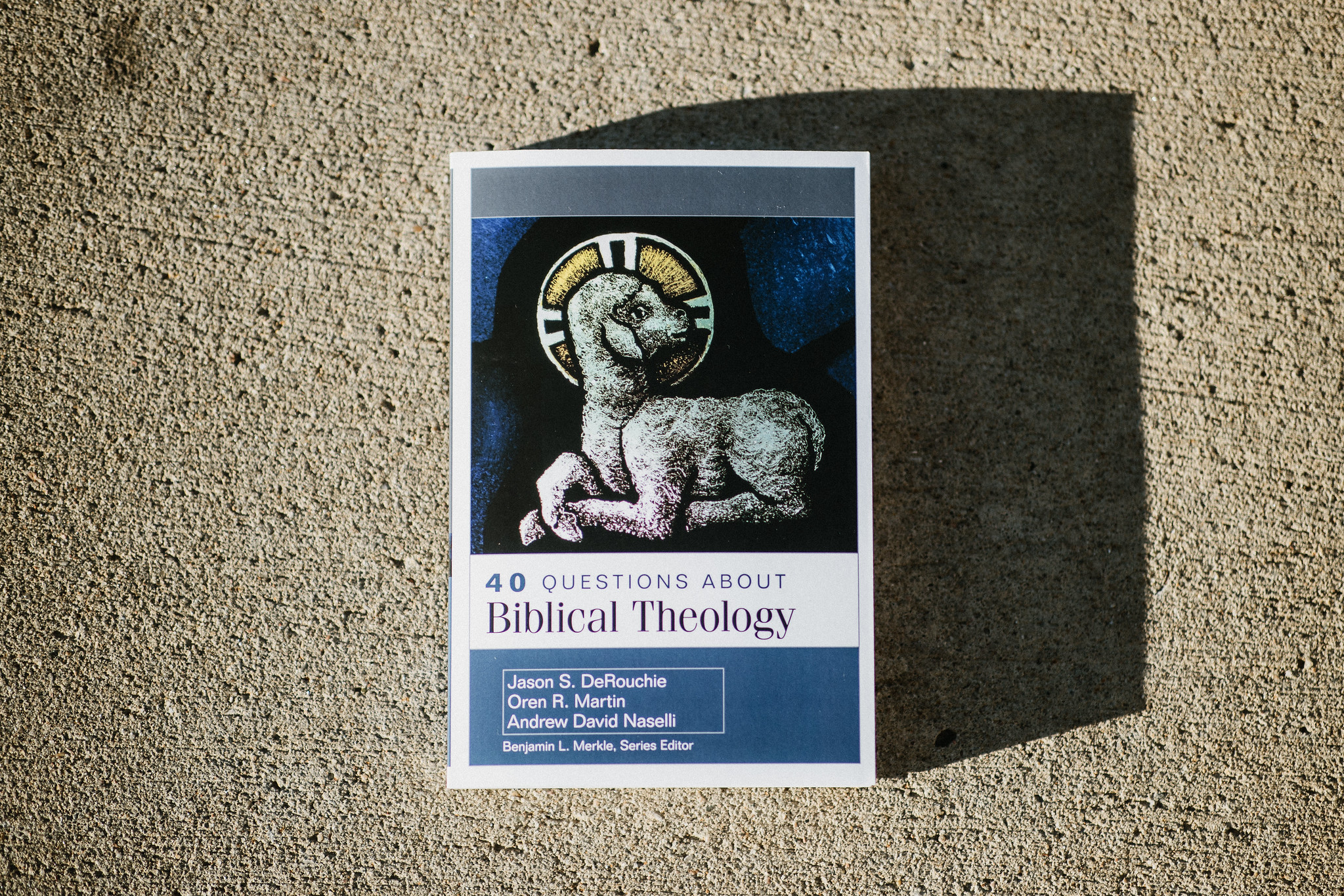
We recently interviewed Dr. Jason DeRouchie, Research Professor of Old Testament and Biblical Theology at Midwestern Baptist Theological Seminary, regarding his recently released project, 40 Questions About Biblical Theology. The volume, co-authored by DeRouchie, Oren R. Martin and Andrew Naselli, is available now from Kregel Academic online or wherever Christian academic titles are sold.
FTC: What was the impetus for writing the 40 Questions volume?
JSD: Biblical theology is the study of how the whole Bible progresses, integrates, and climaxes in Jesus. Because only through Scripture are people reborn in Christ, empowered in holiness, sustained to glory, and satisfied always, Christians must wrestle with biblical theology. Seeing this need, about seven years ago my co-author Oren Martin approached Kregel with the idea, but they initially said, “No.” However, two years later they had a change of mind, so the series editor, Ben Merkle, reached out to Oren, who then reached out to our other co-author, Andy Naselli. At that time, Andy and I were in our second or third year co-teaching an advanced biblical theology course at Bethlehem Seminary, and Andy said that he would only consider the project if I could join in. So after prayer and conversation with our wives, a systematic theologian (Oren), a New Testament scholar (Andy), and an Old Testament scholar (Jason) teamed up to write 40 Questions About Biblical Theology. Andy and I initially drafted the forty questions, then Oren offered feedback and tweaks. We decided who would serve as the primary author of the various chapters based on specialization or interest, and the book was on its way.
FTC: Within the growing body of literature on biblical theology, what unique contribution does this volume make?
JSD: Three elements set this volume in particular apart: (1) Its structure, (2) its content, (3) its perspective.
As for structure, the 40 Questions series is so beneficial because people can choose to read the whole book cover to cover or they can simply find the question that most interests them and read the answer, which almost always comes in 10 pages or less. Not only this, if you just want to know the gist, every chapter ends with a summary, which is then followed by five questions for personal or group reflection.
With respect to content, our volume stands out because it not only defines biblical theology and explores proper method but also illustrates and applies biblical theology with numerous examples. We have chapters that trace themes from Genesis to Revelation (e.g., the covenants, serpent, the people of God, the Law, the Temple, mission, land, resurrection), while others overview how later Scripture uses earlier Scripture (e.g., the use of Exod 15:2 in Isa 12:2; the use of Isa 40:13 and Job 41:11a in Rom 11:34–35; the use of Lev 18:5 in Gal 3:12). We also have chapters that consider how biblical theology helps us teach and preach the OT, how Christians relate to OT promises, how biblical theology should impact the Christian life, how a church can teach biblical theology, and what should motivate us to engage in it.
Finally, with respect to perspective, we truly try to faithfully overview the different systems that conservative evangelicals have employed for articulating how the whole Bible holds together (i.e., dispensational theology and covenant theology). Nevertheless, we also practice a redemptive-historical, Christo-centric approach to Scripture that we believe is faithful to the Bible’s own claims and makeup, that is reformed and baptistic, and that aligns with what evangelicals in the west are now terming progressive covenantal theology.
FTC: What are your (and your co-authors’) hopes for the way the volume will be used?
JSD: We pray that this volume helps people:
- Increasingly recognize that both the Old and New Testaments are Christian Scripture and magnify the person and work of Christ;
- Better understand how the Old and New Testaments progress, integrate, and climax in Jesus;
- See more clearly how Jesus fulfills what the Old Testament promised, realizes what the Old Testament anticipated, and inaugurates in full the new creation, new age, and new covenant in a way that supersedes their old counterparts yet that also awaits complete finalization;
FTC: Who would benefit most from reading this volume?
JSD: This book is targeted toward thoughtful and hungry layman, but it will benefit church leaders and students as well. Anyone interested in seeing and savoring the Triune God and in celebrating his purposes from creation to consummation climaxing in Christ will benefit.
FTC: Why is biblical theology an important discipline/area to give attention to for pastors and church leaders in particular?
JSD: In question 36, I offer the following reasons. Only through biblical theology can we:
- Declare the “whole counsel of God” (Acts 20:26–27);
- Interpret Old and New Testament passages in their God-intended canonical context;
- See the Old Testament’s “mystery” revealed (Rom 16:25–26; cf. 2 Cor 3:14);
- Identify God-intended types in order to better understand and celebrate the antitype;
- Fully celebrate the Messiah and his mission (Luke 24:45–47);
- Faithfully consider the lasting relevance of old covenant laws (Deut 30:8; Matt 5:17–19; 2 Tim 3:16);
- Discern how to claim all the Bible’s promises that are Yes in Christ (2 Cor 1:20); and
- Truly appreciate how God justly justifies the ungodly (Rom 3:26).
To these, in question 38, Oren Martin adds that biblical theology:
- Helps us know God;
- Enables us to gain canonical literacy; and
- Reminds us of the already but not yet realities of our present life.
I (and Paul, Acts 20:26–27) exhort church leaders to preach, teach, and counsel in a way that utilizes all Christian Scripture, and this will only be possible by increasing one’s awareness of how the whole Bible progresses, integrates, and climaxes in Christ.

